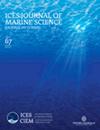了解陆架海近海风电场对整个生态系统影响的范例
IF 3.4
2区 农林科学
Q1 FISHERIES
引用次数: 0
摘要
随着近海风电场(OWFs)在全球范围内的快速扩张,迫切需要评估和预测其对海洋物种、栖息地和生态系统功能的影响。要在整个大陆架范围内做到这一点,同时考虑到气候变化的影响,就需要采用动态、多营养、多领域、以生态系统为中心的方法。然而,由于此类研究和研究系统本身(大陆架海域)都很复杂,我们建议根据调查周期框架来构建未来的环境研究。这样就可以在生态理论的基础上提出并检验具体的假设,从而简化研究过程,并在面对技术进步(如漂浮式海上风力发电)和不断变化的社会经济及政治气候时具有适应性。我们概述了一项战略,通过该战略,我们可以加速了解陆架海开发海上风电场对环境的影响。未来研究的重点包括:确定 OWF 可能会在多大程度上改变初级生产水平;风能提取是否会对生物物理生态系统驱动因素产生连锁反应;中上层鱼类是否会在空间和时间上调解顶级捕食者分布的变化;以及在局部水平上观察到的任何影响将如何扩展并与气候变化和渔业迁移效应相互作用。本文章由计算机程序翻译,如有差异,请以英文原文为准。
A paradigm for understanding whole ecosystem effects of offshore wind farms in shelf seas
With the rapid expansion of offshore windfarms (OWFs) globally, there is an urgent need to assess and predict effects on marine species, habitats, and ecosystem functioning. Doing so at shelf-wide scale while simultaneously accounting for the concurrent influence of climate change will require dynamic, multitrophic, multiscalar, ecosystem-centric approaches. However, as such studies and the study system itself (shelf seas) are complex, we propose to structure future environmental research according to the investigative cycle framework. This will allow the formulation and testing of specific hypotheses built on ecological theory, thereby streamlining the process, and allowing adaptability in the face of technological advancements (e.g. floating offshore wind) and shifting socio-economic and political climates. We outline a strategy by which to accelerate our understanding of environmental effects of OWF development on shelf seas, which is illustrated throughout by a North Sea case study. Priorities for future studies include ascertaining the extent to which OWFs may change levels of primary production; whether wind energy extraction will have knock-on effects on biophysical ecosystem drivers; whether pelagic fishes mediate changes in top predator distributions over space and time; and how any effects observed at localized levels will scale and interact with climate change and fisheries displacement effects.
求助全文
通过发布文献求助,成功后即可免费获取论文全文。
去求助
来源期刊

ICES Journal of Marine Science
农林科学-海洋学
CiteScore
6.60
自引率
12.10%
发文量
207
审稿时长
6-16 weeks
期刊介绍:
The ICES Journal of Marine Science publishes original articles, opinion essays (“Food for Thought”), visions for the future (“Quo Vadimus”), and critical reviews that contribute to our scientific understanding of marine systems and the impact of human activities on them. The Journal also serves as a foundation for scientific advice across the broad spectrum of management and conservation issues related to the marine environment. Oceanography (e.g. productivity-determining processes), marine habitats, living resources, and related topics constitute the key elements of papers considered for publication. This includes economic, social, and public administration studies to the extent that they are directly related to management of the seas and are of general interest to marine scientists. Integrated studies that bridge gaps between traditional disciplines are particularly welcome.
 求助内容:
求助内容: 应助结果提醒方式:
应助结果提醒方式:


